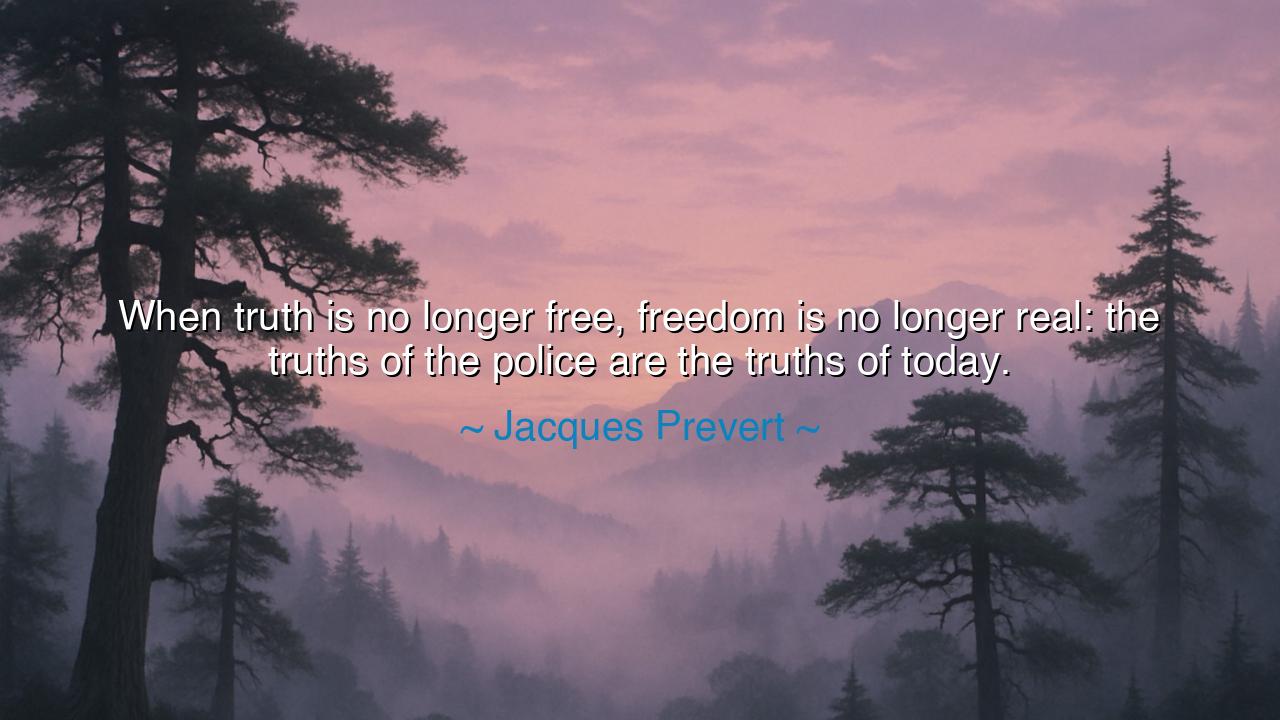
When truth is no longer free, freedom is no longer real: the
When truth is no longer free, freedom is no longer real: the truths of the police are the truths of today.






Host: The calm of the evening filled the room, setting the stage for a thought-provoking conversation. Jack sat at the table, his fingers gently resting on his cup, reflecting on Jacques Prevert’s words. Jeeny stood near the window, her gaze directed outward, considering the implications of the statement.
Jeeny: “I’ve been thinking about what Jacques Prevert said: ‘When truth is no longer free, freedom is no longer real: the truths of the police are the truths of today.’ It’s a powerful and chilling statement, isn’t it? The idea that when truth is controlled or restricted, freedom itself becomes an illusion. And the reference to police truths speaks to how power structures often shape what we perceive as truth. It’s a reminder that the control of information—of truth—has a profound impact on the freedom we experience in society.”
Jack: “Yes, exactly. Prevert is suggesting that the freedom we claim to have is only as real as the truth we’re allowed to see and understand. If truth is manipulated, shaped, or restricted, then that freedom becomes meaningless. The police, in this case, represent the authority that controls what is deemed as the ‘official’ truth, and when that authority dictates the narrative, it shapes not just our perception of the world, but our freedom itself. It’s about how truth is intertwined with power.”
Jeeny: “Right. And I think it’s also about how truth is often used as a tool to maintain control. When those in power decide what truth is, they also decide what freedom looks like. Prevert is warning us that when the truth is owned or manipulated by a select few, especially authorities like the police, the very foundation of our freedom starts to erode. It’s a reminder that without access to truth, we’re not truly free—we’re living in a distorted reality shaped by those who hold power.”
Host: The stillness in the room deepened as they both reflected on the relationship between truth and freedom. Jack’s fingers rested on the table, while Jeeny’s expression softened, considering the critical importance of truth in sustaining a truly free society.
Jack: “It makes me think about how truth can be easily manipulated, especially in situations where there’s a power imbalance. We often assume that truth is objective, that it’s something we can all access freely. But Prevert is showing us that when truth is controlled, whether by the government, law enforcement, or any other powerful institution, it changes the nature of freedom itself. If we don’t have access to real truth, then what does our freedom really mean?”
Jeeny: “Exactly. Prevert is asking us to reflect on how often we take truth for granted. We assume that the information we’re fed is accurate, but when it’s controlled or shaped by powerful forces, we’re not getting the whole picture. Truth isn’t just about facts—it’s about transparency and access. When that’s limited, freedom is no longer genuine.”
Jack: “And I think that’s what makes this so unsettling. The police—and any authority figure that controls truth—don’t just control what we see or understand. They control our very sense of what’s real, and in doing so, they control the freedom we think we have. Prevert is showing us that when truth becomes privileged or distorted, freedom itself becomes something fragile and easily manipulated.”
Jeeny: “Yes, and I think that’s the danger of complacency. Prevert reminds us that freedom isn’t something that’s guaranteed—it’s something that needs to be protected. When we stop questioning the truths we’re told, when we accept what we’re given without thinking critically, we’re allowing those in power to define our reality for us. Truth and freedom go hand in hand, and if one is compromised, the other is too.”
Host: The quiet in the room grew deeper as they reflected on the powerful message in Prevert’s words. Truth is not just an abstract concept—it is the bedrock of freedom, and when it is manipulated or controlled, the very nature of freedom becomes threatened. Jack leaned back slightly in his chair, while Jeeny’s gaze turned from the window back to him, both of them understanding the profound implications of Prevert’s statement.
Jack: “So, Prevert is really showing us that freedom can only exist when truth is free. When truth is controlled, distorted, or hidden, the idea of freedom becomes a facade—it’s no longer real. Freedom and truth are intrinsically linked.”
Jeeny: “Exactly. Prevert reminds us that we can’t take truth for granted. If we let others control what we’re told is real, we risk losing the very freedom we value. We have to actively protect the truth and ensure that it remains accessible to everyone, because without that, true freedom cannot exist.”
Host: The evening had fully settled in, the quiet understanding between them a reminder that truth is the foundation of a truly free society. Jacques Prevert had shown them that when truth is manipulated or controlled, freedom is no longer real. The world outside had darkened, but inside, there was light—a recognition that the preservation of truth is essential to maintaining genuine freedom.






AAdministratorAdministrator
Welcome, honored guests. Please leave a comment, we will respond soon